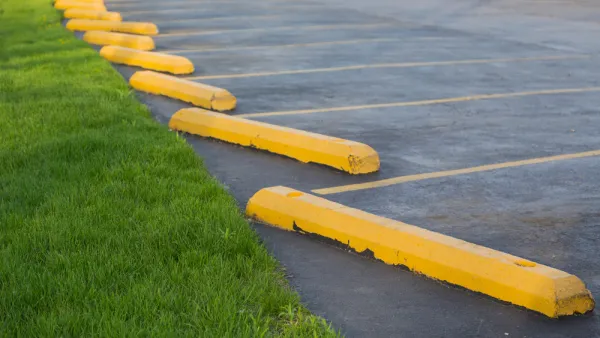In cities big and small, the tide is turning against sprawling parking lots, car-centric development, and minimum parking mandates.

American cities, designed for decades to accommodate private cars, are starting to see the benefits of reducing the amount of land used for parking and supporting other transportation modes.
According to an article by Jane Margolies in The New York Times, “The United States has about two billion parking spots, according to some estimates — nearly seven for every car. In some cities, as much as 14 percent of land area is covered with the black asphalt that engulfs malls, apartment buildings and commercial strips.” But today, as housing costs rise, housing supply fails to keep up with demand, and the negative impacts of sprawl and carbon emissions are more broadly understood, minimum parking requirements—mandates that dictate how much parking a developer must provide for a project based on the project’s use, and that often call for more parking than actually needed—are being revised or eliminated in cities and states around the country. Shifting work patterns are also reducing the need for parking in some areas, making it a good time for cities to evaluate the need for parking mandates.
Margolies outlines the history of off-street parking in the U.S., which correlates with the rise of private car ownership. “In the postwar period, when Americans were in thrall with the automobile and the federal government unfurled highways across the land, parking minimums were enshrined in zoning codes to ensure that Americans would always find a paved parallelogram waiting for them at the end of their trip.” Margolies explains that these mandates were not based on any real calculation of need, but became enshrined in the zoning codes of most cities.
Aside from promoting car ownership and inducing sprawl, parking requirements also drive up the cost of development. “Even a basic, stand-alone parking structure costs nearly $28,000 per spot on average, not including land, said Rob McConnell, a vice president at WGI, an engineering firm.” Parking reform advocates like University of California, Los Angeles (UCLA) professor Donald Shoup have spent decades arguing that parking policy has a major impact on housing and transportation costs, urban design, mobility, walkability, and quality of life.
Margolies highlights the success of the first major U.S. parking reform program in Buffalo, New York, where “A 2021 study revealed that after the repeal, new major developments overall had 21 percent fewer spaces than the minimum parking mandates would have required.” Other reforms followed at local and state levels, signaling a growing movement to reimagine how parking fits into cities.
FULL STORY: Awash in Asphalt, Cities Rethink Their Parking Needs

Analysis: Cybertruck Fatality Rate Far Exceeds That of Ford Pinto
The Tesla Cybertruck was recalled seven times last year.

National Parks Layoffs Will Cause Communities to Lose Billions
Thousands of essential park workers were laid off this week, just before the busy spring break season.

Retro-silient?: America’s First “Eco-burb,” The Woodlands Turns 50
A master-planned community north of Houston offers lessons on green infrastructure and resilient design, but falls short of its founder’s lofty affordability and walkability goals.

Test News Post 1
This is a summary

Analysis: Cybertruck Fatality Rate Far Exceeds That of Ford Pinto
The Tesla Cybertruck was recalled seven times last year.

Test News Headline 46
Test for the image on the front page.
Urban Design for Planners 1: Software Tools
This six-course series explores essential urban design concepts using open source software and equips planners with the tools they need to participate fully in the urban design process.
Planning for Universal Design
Learn the tools for implementing Universal Design in planning regulations.
EMC Planning Group, Inc.
Planetizen
Planetizen
Mpact (formerly Rail~Volution)
Great Falls Development Authority, Inc.
HUDs Office of Policy Development and Research
NYU Wagner Graduate School of Public Service




























